Johns Hopkins University Battle of the A Cappella Groups 2011
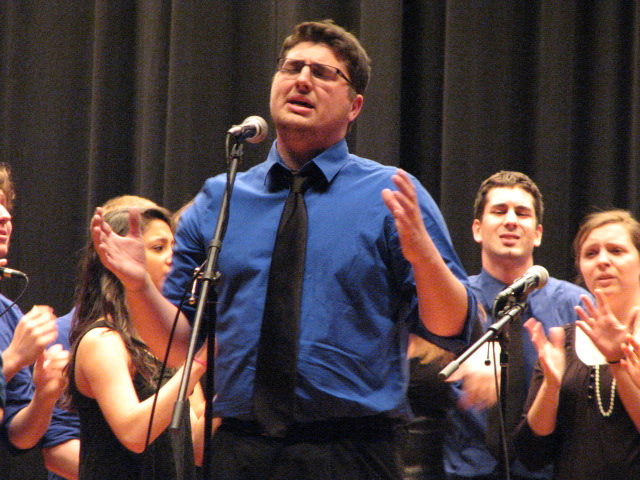
On Friday, April 29, 2011, Johns Hopkins University held The Battle of the A Cappella Groups. Five Hopkins groups competed for bragging rights and a prize of $500. The set up had each group perform two songs—the first a traditional Hopkins song, the second a song that represented the group’s identity. Judges, including the president of the Alumni Association and alumni of the prestigious Peabody Institute, evaluated each of the groups in categories including musicality, entertainment, and school spirit. Before we get to the review, a quick summary:
The Competitors:
The Johns Hopkins University Vocal Chords
Johns Hopkins University Kranti
The Johns Hopkins University All-Nighters
Johns Hopkins University Ketzev
The Johns Hopkins University Octopodes
Host Group:
The Johns Hopkins University Mental Notes
Photos from this event are available on our Facebook page.
There’s a decidedly different feel about an intra-campus contest like this one in comparison to a multi-school competition, like those hosted by Varsity Vocals in the International Championship of Collegiate A Cappella. On one hand, it’s a smaller event by most any measure—fewer groups, a sliver of the audience, shorter sets, and no cost of admission. On the other hand, the localized nature of a show like this is inviting for groups that wouldn’t otherwise compete to take part and show off their best material to an audience of friends and University alumni. There’s something to be said for taking some of the spotlight and some of the pressure off of a competition, and emerging with more of a good natured, fun showcase.
The evening of a cappella kicked off with The Mental Notes, a comedy group clad in Hawaiian shirts. They sang a parody of Bonnie Tyler’s “Holding Out for a Hero,” “I Need a Gyro,” which documented the travails of a Hopkins student striving to find a hunger-sating gyro sandwich. Harmless fun, which seemed a little clipped, but did a good job of introducing the a cappella style to the crowd, and getting things off to a light-hearted start.
The emcees preceded each act with a brief introduction to the group and the names of the two songs they would sing. It was interesting to hear the song choices announced first—it gave the show some structure and some of the comfort that comes with predictability. On the other hand, it sort of assured us that no big surprises were on the way—more on that to follow.
The first of the groups to compete was The Vocal Chords. The mixed group opened with “The Black and Blue.” They took it on chorally, with some nice harmonies and a nicely-textured, layered melody early in the song. Solid bass sound. The arrangement all around was pretty simple. The group developed a few moments of nice dynamic variation, but all in all, it was a school fight song, and there’s only so much to be done to make that interesting. Good opener.
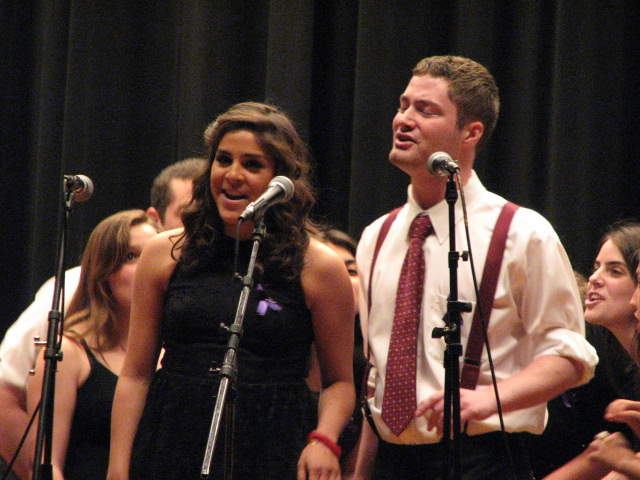
The Vocal Chords followed with Aerosmith’s “Jaded.” Really? Jaded? The way in which the competition was set up sort of handcuffed groups a bit because their first song had to be a school song (and given that there were no repeats throughout the night, I presume those songs were assigned or at least predetermined among the groups). With that in mind, groups needed to be very conscious of their second song selections. The guiding criteria was to pick something that represents the group, but were I making decisions for my group, I would angle more toward winning over the crowd, and by extension the judges. The second song should have been one the group performs really well, but beyond that, I would aim for something either contemporary or old school enough to win over judges of a certain vintage; I would aim for a well-known song, something upbeat, and a song that that shines a spotlight on a strong soloist, because soloists, over complexity of arrangement, generaly win over a cappella novices. “Jaded” was a strange song choice because it was sort of in-between by every measure. It’s not old enough to be a classic, not new enough to be called contemporary. It got radio play, but it’s not exactly an iconic choice from the Aerosmith catalog. It has sort of a rock beat, but the overarching melancholy groove of the song keeps it from the being the sort of song that makes you want to get up dance. To her credit, the soloist was quite good, emoting a good level of swagger and stage presence. The group sounded pretty good, too, but my biggest gripe there is that the dynamics were pretty much purely directional—rather than giving us peaks and valleys and building toward huge moments, they just seemed to get louder with each passing verse and chorus, for no clear reason beyond just giving us a gradual crescendo.
The second group to compete was a Hindi co-ed ensemble called Kranti. The group looked great with green shirts and black slacks for the guys, black tops and jeans for the women. They opened with “On the Line.” The group started very, very slow and chorally. They just couldn’t seem to find a handle on the blend for a less than pleasant start. Things picked up, though, when the perc and the vocal instrumentation kicked in later in the song. The VP was quite good there.
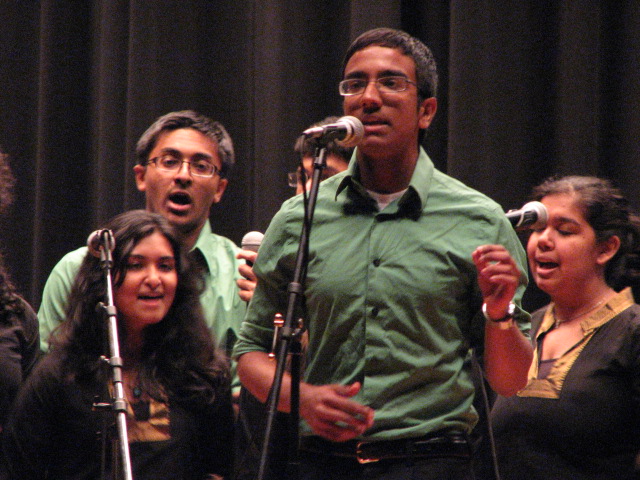
Kranti progressed to a mashup of a Hindi song and Train’s “Hey Soul Sister.” This was one point of the night in which a group really would have benefited from not having their song selections announced in advance—the addition of the Train song was a welcome departure into a song with which the audience was more familiar and more comfortable, and the first transition really could have been more dramatic had we not seen it coming. Anyway, to address the performance itself, mashups present an interesting conundrum for today’s a cappella groups. Used appropriately, they mark one of the coolest ways in which a group can innovate and make songs their own. Used less constructively, such songs can sound really thrown together and keep the group and the audience from fully engaging with either song choice. Unfortunately, I would place this song choice squarely in the latter category. It’s possible the Hindi song is one about sisters, or that it's otherwise thematically connected, but the connection just wasn’t evident to me, and it sounded completely like two disparate songs spliced together. The group made some good decisions about when to switch back to the Train song. Most notably, there’s the “Well you can cut a rug” bridge which has a lot of potential to win over a crowd, particularly if the soloist hams up the “so gangster, I’m so thug” lyric (and let’s face it, if you’re not, yourself, clearly both gangster and thug, or if you’re not Patrick Monahan himself, you need to ham this up). Unfortunately the soloist just sort of sang it, letting the potential moment slip away. The sopranos sang some grating syllables against the block chords in the background for a bit of a cacophonous sound. I like the idea of Hindi-pop-rock fusion a cappella, and hope Kranti will be able to build off this ambitious foundation to develop on its potential from here.
The third group to take the stage was JHU’s only all-male group, The All-Nighters. The guys took the stage in their traditional outfit of vests, khakis, white shirts and ties. Their school song was “Johnny Hopkins on to Victory.” Though it was a bit less creative than what other groups endeavored to do, I actually sort of appreciated the old-fashioned choral take on this song—just taking the original song and executing it with power and confidence. Good call on breaking into vocal parts for a well-harmonized finish.
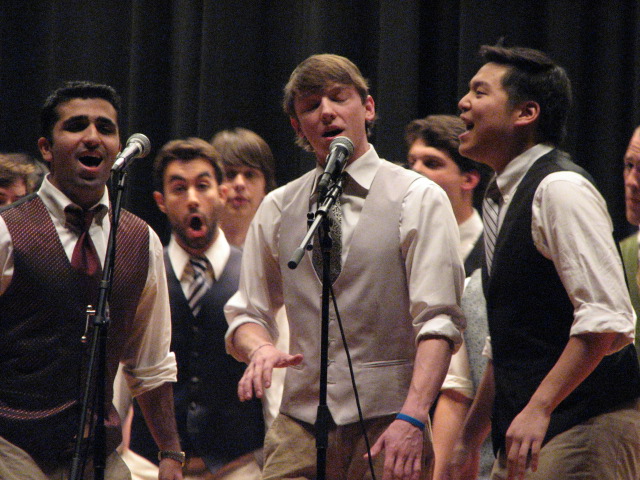
The All-Nighters continued with Toto’s “Africa.” Very good soloist here, though he seemed a little withdrawn and reserved for my tastes. Very good, complex sound from the group. Nice backing solos for a neat three-part harmony on the choruses. Fun “whoosh”ing sound as the group transitioned from choruses back to the verses. My biggest gripe here was that the group should have done more to build the drama. Each verse and chorus followed more or less the same structure, which led a performance that felt redundant and far longer than it actually was. For example had the group only added the second soloist on the first chorus, then added the third guy on the second chorus, it would have gone a long way toward making the choruses feel more distinctive. Unless you’re going to do something earth shattering with your sound or performance, you need so diversify in order to hold onto the audience. Anyway, a few fun visuals throughout, and I liked the decision for the group to fall out and allow the three soloists to sing alone the final lyrics of the song. The guys left the stage with a well-rehearsed bow, which sort of represented the differences between this group and the ones that preceded it—they demonstrated the confidence of competition experience, and a certain level of professionalism evident in more seasoned groups.
Ketzev was next out of the shoot. The co-ed Jewish group wore blue t-shirts and jeans on stage for a less formal, but more fun look than most of the competitors. They opened with “The Homewood Song.” The group started slow and sped into a perc-laden groove. The solo was pretty thin on this one, and the group kept its sound very simple, with basses swallowing the sound of the rest of the group, including, at times, the soloist. The fast part was better than the slower portion, and the group made the clever call to slide in some Hebrew to speak to its identity.
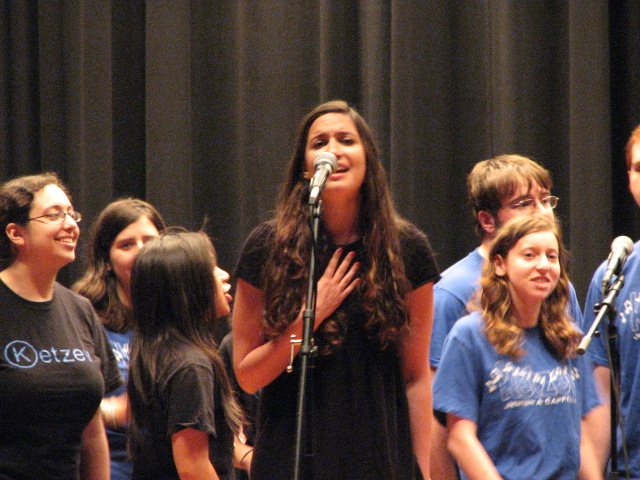
The second song for Ketzev was Cee Lo Green’s “Forget You.” This was probably the smartest song selection of the night, picking something fun and contemporary that casual fans probably wouldn’t expect to hear performed a cappella. Fun bass and perc duel to open the song. The group made the unfortunate call to isolate its drummer before long. Stranded off on the side of the stage, he performed his part well, but looked pretty awkward out on his own. Decent female solo here, but the most fun moment was the show-stealing backing vocalist who came up to squawk the “Yeah, go run and tell your little boyfriend” and “Ooh, I really hate your ass right now" lines. I wish they could have done more to sell the drama of those moments, but they remained entertaining for what they were. Unfortunately, the song on the whole just came across really simple and slow and, like “Africa” earlier, failed to generate enough moments or variation, and consequently felt really, really long.
The final group to compete was The Octopodes, fresh off their run to the ICCA South Semifinals this year, en route to which they won their ICCA quarterfinal right in the same performance hall as this night’s competition. The group looked sharp with the guys in black slacks and ties, with blue shirts; the women in black dresses. They started in with “Freshy.” While the decision to perform chorally and to start slow, then speed up into a VP-driven rock finish was far from original for the night, the way in which the group executed each part and the transitions made all the difference. First off, you had a group member standing in front of the group, dramatically removing a baton, and conducting the opening with very funny, theatrical movements. Then you had the musical precision with which the group executed the first leg of the song. From there, you have the faster part, with by far the strongest percussion of the night, and the continuation of the strong tuning and cohesion from the beginning of the song. The conductor returned at the end to cap off the best sounding, and certainly the most fun school spirit song of the night. After this opener, the competition was clearly The Octopodes’ to lose.
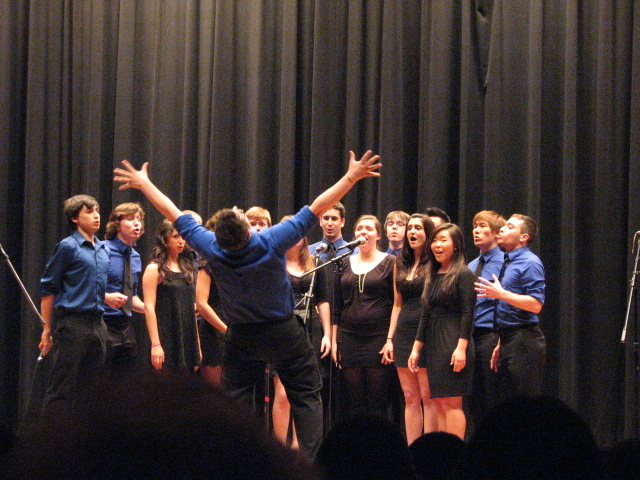
The group followed with “Breakeven” by The Script. What can you say? The ‘Podes brought a Star Trek phaser to an Old West gun fight; a Rottweiler to a dog fight; a UFC champion to a high school shoving match. Sensational solo on this one that built nicely as it went and ripped on the close. Excellent percussion again. Captivating arrangement, highlighted by the haunting repetition of “she doesn’t know.” Perfectly conceived beat of silence to manufacture a moment going into the second chorus. I could have done without some of the dramatic bobbing and leaning, but it’s a minor quibble, and it was actually nice to see some bits of movement after a mostly stationary night of a cappella. Top to bottom, this was an excellent performance that concretized The Octopodes’ place as the night’s champions.
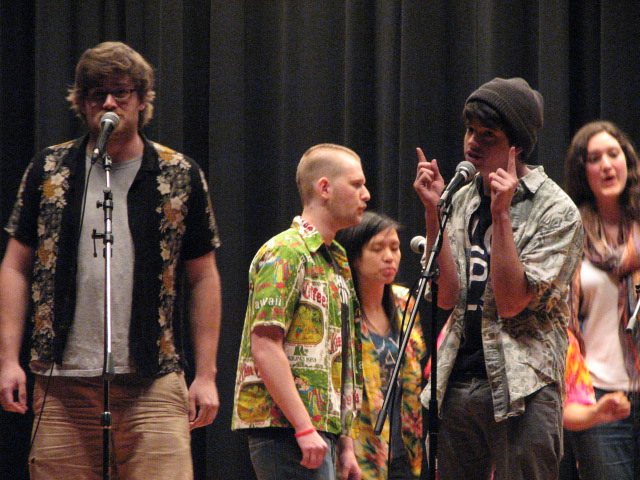
While the judges deliberated, The Mental Notes performed again, this time taking on songs including “One Semester of Spanish Spanish Love Song” and a classical medley (in which the words “your mom” were repeated to various classical melodies).
The judges returned. The Alumni Association president took center stage and justly awarded second place to The All-Nighters, before handing over an over-sized check for $500 to The Octopodes for winning the night’s competition.
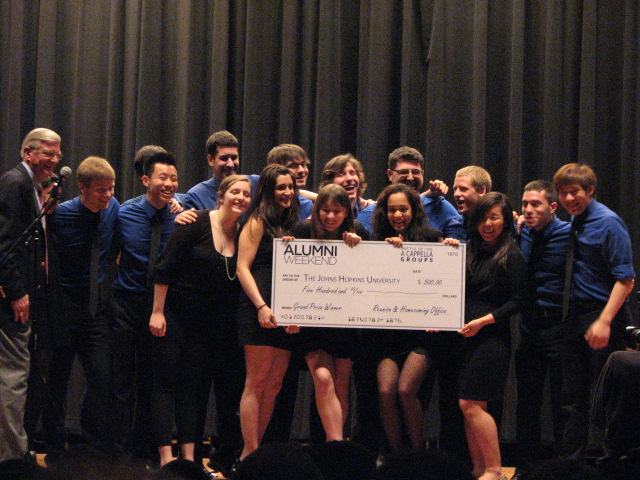
It’s a lot of fun to hear so many of JHU’s groups compete in one night. On one hand, I worry the variation in level of performance between groups could be discouraging for some of the participants. In a context like this, you hope that everyone takes it as a learning experience and builds upon the positive, supportive atmosphere a small, home school audience will give you. All in all, the audience got a fun night of a cappella to help celebrate the tradition of the University and round out the academic year.
ACB Picks for the Night
Overall Placement:
1. The Octopodes
2. The All-Nighters
3. The Vocal Chords
Best Soloist: The Octopodes for "Breakeven"
Honorable Mention: The Vocal Chords for "Jaded," The All-Nighters for "Africa"
Best Vocal Percussion: The Octopodes for "Breakeven"
Best Arrangement: The Octopodes for "Breakeven"
Honorable Mention: The All-Nighters for "Africa," The Octopodes for "Freshy"
Official Results
Overall Placement:
1. The Octopodes
2. The All-Nighters